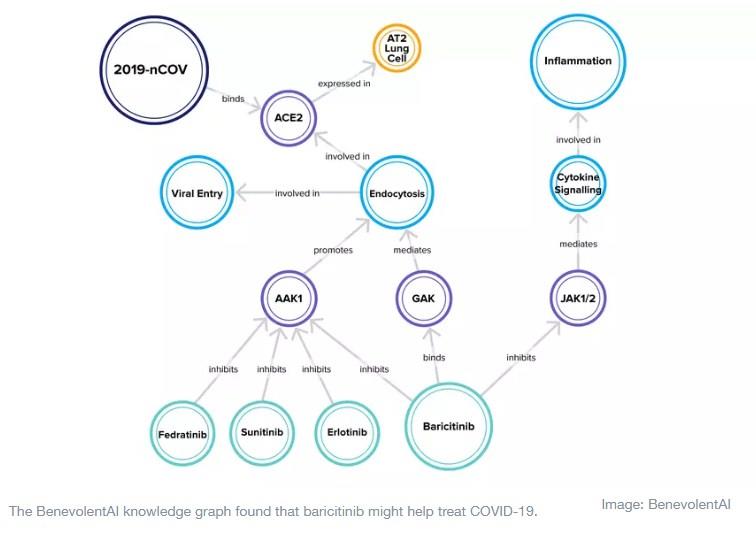by Joanna Shields*
The sudden appearance and rapid spread of COVID-19 took governments and society by surprise. As they dusted off pandemic response plans and geared up to fight the virus, it became clear that we needed to turbo-charge R&D efforts and find better ways to hunt down promising treatments for emerging diseases.
Artificial intelligence (AI) has proven a powerful tool in this fight.
In a pandemic, speed is of the essence. Although scientists managed to sequence the genetic code of the new coronavirus and produce diagnostic tests in record time, developing drugs and vaccines against the virus remains a long haul.
AI has the power to accelerate the process by reasoning across all available biomedical data and information in a systematic search for existing approved medicines – a vital step in helping patients while the world waits for a vaccine.
Machines excel in handling data in fast-changing circumstances, which means machine learning systems can be harnessed to work as tireless and unbiased super-researchers.
This is not just theory. In late January, using its proprietary platform of AI models and algorithms to search through the scientific literature, researchers at BenevolentAI in London identified an established, once-daily arthritis pill as a potential treatment for COVID-19. The findings were published in two papers in The Lancet and The Lancet Infectious Diseases, in line with our commitment under the Wellcome Trust pledge to share our coronavirus-related research rapidly and openly.
The discovery followed a computer-driven hunt for drug candidates with both antiviral and anti-inflammatory properties, since in severe cases of COVID-19 it is the body’s overactive immune response that can cause significant and sometimes fatal damage.
The drug, baricitinib, is currently marketed by Eli Lilly to treat rheumatoid arthritis. Now, thanks to AI, it is being tested against COVID-19 in a major randomised-controlled trial in collaboration with the U.S. National Institute for Allergies and Infectious Diseases (NIAID) in combination with remdesivir, an antiviral drug from Gilead Sciences that recently won emergency-use approval for COVID-19. Eli Lilly has now commenced its own independent trial of baricitinib as a therapy for COVID-19 in South America, Europe and Asia.

The system used to identify baricitinib was not actually set up to find new uses of existing medicines, but rather to discover and develop new drugs – a sign of the potential for AI to uncover novel insights and relationships across an unlimited number of biological entities. In a crisis like COVID-19, it clearly makes sense to hunt through already approved drugs that can be ready for large-scale clinical trials until vaccines are approved and readily available in the global supply chain.
The long-term promise of AI goes far beyond COVID-19
BenevolentAI’s vision is to dramatically improve pharmaceutical R&D productivity across the board and to expand the drug discovery universe by making predictions in novel areas of biology. Currently, around half of late-stage clinical trials fail due to ineffective drug targets, resulting in only 15% of drugs advancing from mid-stage Phase 2 testing to approval.
Using a “knowledge graph” composed of chemical, biological and medical research and information, the company’s AI machine learning models and algorithms can identify potential drug leads currently unknown in medical science and far faster than humans. While such systems will never replace scientists and clinicians, they can save both time and money. And the agnostic approach adopted by machine learning means such platforms can generate leads that may have been overlooked by traditional research.
The endeavour has already led to an in-house project on amyotrophic lateral sclerosis (ALS), ulcerative colitis, atopic dermatitis and programmes with partners on progressive kidney and lung diseases, as well as hard-to-treat cancers like glioblastoma.
The ability of machines to solve complex biological puzzles more rapidly than human experts has prompted increased investment in AI drug discovery by a growing number of large pharmaceutical companies.
And AI is also being harnessed in other areas of medicine, such as the analysis of medical images. This encompasses long-standing work on cancer scans and much more recent efforts to use computer power to identify COVID-19 from chest X-rays, including the open-access COVID-Net neural network.
Clearly, COVID-19 has been a wake-up call for the world. It seems this outbreak may be part of an increasingly frequent pattern of epidemics, fuelled by our hyper-connected modern world. As a result, medical experts are braced for more previously unknown “Disease X” threats in the years ahead as viruses jump from animals to humans and jet around the world.
Technology has helped create a world in which pathogens like COVID-19, SARS and Zika can spread. But technology, in the form of AI, can also provide us with the weapons to fight back.
*Chief Executive Officer, BenevolentAI
**first published in: www.weforum.org




 By: N. Peter Kramer
By: N. Peter Kramer
